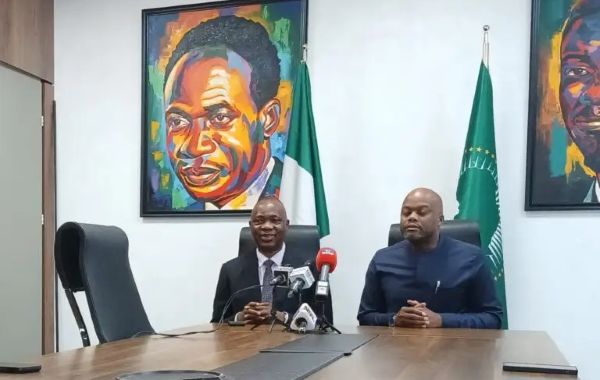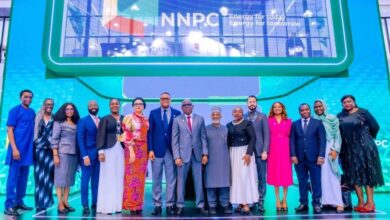AfCFTA Endorses Nigeria Customs’ C-PACT Initiative to Accelerate Intra-African Trade

Africa’s journey toward a unified trading system received a major boost as the African Continental Free Trade Area (AfCFTA) formally endorsed the Customs-Partnership for African Cooperation in Trade (C-PACT) — an ambitious initiative pioneered by the Nigeria Customs Service (NCS) to strengthen cross-border efficiency and unlock Africa’s full trade potential.
The endorsement, announced during a high-level meeting between AfCFTA Secretary-General Wamkele Mene and Comptroller-General of Customs, Bashir Adewale Adeniyi, at the AfCFTA headquarters in Accra, marks a defining moment for Africa’s quest to build a seamless and competitive trade ecosystem driven by technology, transparency, and collaboration.
The C-PACT initiative, jointly developed by the Nigeria Customs Service and the African Export-Import Bank (Afreximbank), with the support of the World Customs Organisation (WCO), will hold its inaugural conference in Abuja from November 17 to 19, 2025. The conference is expected to convene customs authorities, trade ministries, and private sector players from across the continent to redefine how Africa trades with itself.
C-PACT: The Framework for a New African Trade Era
The Customs-Partnership for African Cooperation in Trade (C-PACT) aims to establish a modern, transparent, and agile customs collaboration framework across African countries — a system designed to eliminate bottlenecks, promote lawful trade, and stimulate sustainable economic growth under the AfCFTA umbrella.
According to AfCFTA’s Wamkele Mene, the initiative represents a “critical operational bridge” for the implementation of AfCFTA’s trade facilitation protocols, particularly in customs automation, border cooperation, and data harmonisation.
“C-PACT is essential because it institutionalises the collaboration required to make the AfCFTA a reality,” Mene stated.
“It’s not just a customs partnership — it’s the backbone of Africa’s shared prosperity agenda. We look forward to a sustainable dialogue that drives real results.”
Mene reaffirmed that African leaders have mandated customs authorities to work closely with the Nigeria Customs Service in bringing the pact to life — recognising that customs administrations are the engine rooms of Africa’s intra-continental trade ambition.
Nigeria Leads Africa’s Customs Modernisation Drive
For Comptroller-General Bashir Adeniyi, who also doubles as the President of the World Customs Organisation (WCO), C-PACT is both a strategic and moral responsibility — a call to transform customs operations into drivers of growth rather than bureaucratic obstacles.
“C-PACT is our blueprint for modern African trade facilitation. It’s about efficiency, technology, and shared prosperity,” Adeniyi said.
“Customs must play a central role in continental integration. Our data systems, inspection processes, and clearance frameworks must evolve to support the AfCFTA’s vision.”
Adeniyi noted that customs authorities must take ownership of trade data management, given that weak data collection remains one of Africa’s biggest obstacles to accurate trade measurement and policy design.
He added that Nigeria’s Customs Modernisation Project — underpinned by digital tools and artificial intelligence — offers a model for replicable success across Africa.
“We are determined to strengthen AfCFTA’s operational structure by aligning C-PACT with its institutional framework to ensure practical, measurable results,” he said.
Strategic Collaboration Across Africa’s Trade Ecosystem
The partnership between NCS, Afreximbank, and AfCFTA signals a new chapter in the continent’s blue economy and maritime logistics evolution. C-PACT’s goals extend beyond port and customs systems — they encompass digital integration of shipping, logistics, warehousing, and financial settlement systems across borders.
This synergy is expected to:
- Harmonise tariff regimes and trade data, enabling better market intelligence.
- Reduce cargo clearance times, boosting competitiveness at African ports.
- Encourage compliant and transparent cross-border trade, particularly for SMEs and exporters.
- Strengthen maritime infrastructure integration, creating a unified network of African ports linked through digital customs systems.
Through initiatives like C-PACT, the African maritime sector could witness a new wave of efficiency comparable to Europe’s Schengen-style trade framework — one that allows goods, data, and services to move seamlessly from Lagos to Accra, from Mombasa to Durban.
BRANDECONOMY ANALYSIS: The Broader Implications for Africa’s Blue Economy
From a trade and maritime development standpoint, C-PACT is more than a customs initiative — it is the structural foundation for Africa’s economic independence in the 21st century.
1. Driving Regional Value Chains:
C-PACT will help eliminate redundant customs barriers, allowing manufacturers in Nigeria, Ghana, and Kenya to access wider markets faster and more efficiently.
2. Boosting Port Efficiency and Investment:
With AfCFTA’s backing, the initiative could catalyse new investments in port infrastructure, logistics technology, and maritime insurance — key components of Africa’s blue economy.
3. Enabling Data-Driven Trade Policy:
Unified customs data systems under C-PACT could provide real-time trade analytics, helping policymakers design smarter, evidence-based economic interventions.
4. Positioning Nigeria as Africa’s Trade Gateway:
By spearheading C-PACT, Nigeria strengthens its position as West Africa’s logistics and trade hub, bridging maritime commerce between Africa, Europe, and the Americas.
In the long term, C-PACT could emerge as Africa’s most transformative trade facilitation framework since AfCFTA’s inception, helping the continent increase intra-African trade from the current 14% to over 30% by 2030.











